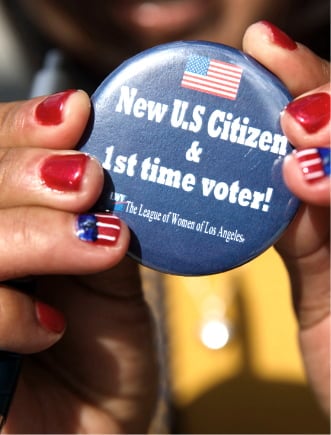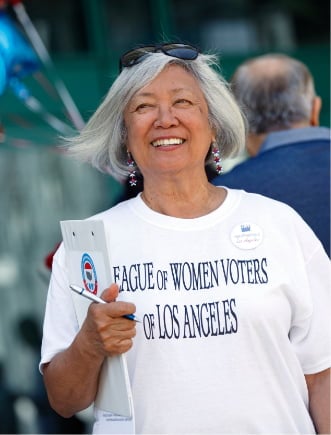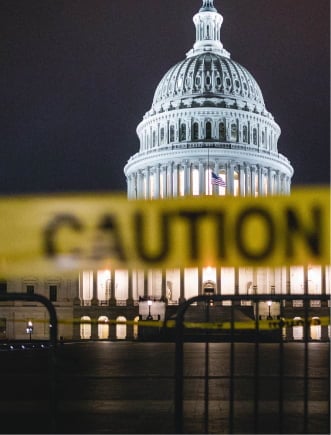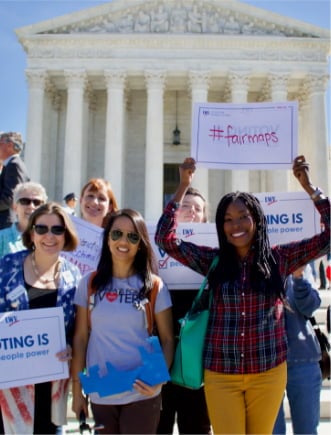This story was originally published by The Hill.
Late-game efforts to reform the redistricting process that will get underway next year are suffering coronavirus setbacks, sidelining even basic campaign practices like gathering signatures.
Supporters of redistricting reform must collect tens or hundreds of thousands of signatures to get initiatives on November’s ballot. But the COVID-19 restrictions in place in many cities and states have significantly hampered their ability to do so, prompting some campaigns to turn to the courts for help.
State officials in places like Nevada and Oregon have resisted efforts to delay petition deadlines or reduce the number of signatures required to make the ballot. In Oklahoma, organizers withdrew their petition, a recognition that they could not overcome coronavirus hurdles.
For campaigns in those states, there will be no next year — if signature requirements are not met and measures are not approved before the printing of November ballots, redistricting laws currently on the books will govern the next decade of political representation.
“Redistricting has to happen in 2021 no matter what,” said Katie Fahey, who led a successful ballot measure campaign in Michigan in 2018 to reform redistricting laws. “These laws, if the public wants them to be changed, need to be changed now — otherwise the next 10 years are impacted.”
Each decade, after the census, states redraw their congressional and state legislative district boundaries to reflect new population figures. Most states give legislatures the power to draw district boundaries, but an increasing push to reform the process and transfer map-making power to independent commissions has gained traction in recent years.
Since the 2011 redistricting process, and with the advance of new software capabilities, more than a dozen states have seen efforts to change state law.
In 2018, successful ballot initiatives rewrote redistricting rules in five states, mandating the use of bipartisan or independent commissions or strengthening rules eliminating partisan map-drawing.
Those ballot initiatives have become more urgent after the Supreme Court ruled last year that partisan redistricting cases could not be heard in federal court.
After that ruling, a new round of campaigns emerged in Arkansas, North Dakota, Nevada, Oregon and Oklahoma to change state constitutions or laws regarding the redistricting process via ballot measures.
The reform movement has become a target for a bipartisan set of legislators who want their cartographic powers restored. Republican state lawmakers in Michigan, Missouri and Utah are trying to dismantle redistricting laws created in 2018 via ballot measures.
Democratic administrations in Nevada and Oregon have been fighting redistricting reform groups in court, delaying the process by filing appeals against the text of ballot measures and refusing to accommodate for the pandemic in setting rules for the signature collection process.
Yurij Rudensky, redistricting counsel at the Brennan Center for Justice, said bipartisan opposition to redistricting reform is widespread.
“The grip on power and the desire to control something as central as redistricting to how politics play out is not unique to Republicans or Democrats,” Rudensky said. “Both parties are looking for ways to maintain, in places where they currently hold political power, influence over redistricting.”
Ballot measures have become a popular manner of achieving redistricting reform, mainly because parties in power are unlikely to legislate their own loss of map-drawing power.
But the nature of the ballot measure process has made it more susceptible to the pandemic than lawmaking in state legislatures.
With the cancellation of large festivals and state fairs, face-to-face interactions discouraged and spring deadlines that passed amid lockdowns, groups have had to shift budgets and strategies, pursuing mail campaigns or attempting legal recourse to move deadlines or allow for electronic signatures.
In Arkansas and North Dakota, groups successfully delivered the required signatures, despite federal judges and appeals courts denying them the ability to use electronic signatures.
But in other states, members of both parties have met organizers in court with a litany of legal challenges and a refusal to be adaptable, causing organizers in Oklahoma to pull the plug on their project and leaving those in Oregon and Nevada in limbo.
In Oklahoma, where Republicans control the state government, People Not Politicians Oklahoma, the group working to establish an independent redistricting commission, was met with opposition at each point in the ballot-initiative process, said Andy Moore, the group’s executive director.
From their initial filing in October, state GOP donors and allies issued legal challenges against the proposal’s constitutionality. By the time all of the appeals had been sorted out by the Oklahoma Supreme Court, the pandemic had hit, and Oklahoma Secretary of State Michael Rogers issued a hold on signature collection across the state on March 18.
Moore said the group was informed July 3 that they could begin collecting signatures, and would have to collect 177,958 in-person signatures by Aug. 24 to get their question on November’s ballot.
After months of litigation, Moore said the group was no longer able to fight the ruling. Last week, they withdrew their question.
“It’s crushing,” Moore said. “It’s been so frustrating. We have thousands of people that have been working for a year almost to get this on the ballot, and then to get to the point that we can’t really get the signatures was really disappointing.”
The National Republican Redistricting Trust did not respond to requests for comment on the Oklahoma case.
In Oregon, where Democrats have near-total control over state government, another branch of People Not Politicians has been met with similar legal challenges. Norman Turrill, one of the ballot measure’s chief sponsors, said his group submitted their question, which would move control of redistricting to an independent commission, in November. After facing and defeating a series of appeals from Democratic-aligned groups all the way up to the state Supreme Court, Turrill said the group was given permission to begin collecting the required 150,000 signatures in April.
But in a pandemic, that became difficult. Despite a 6 percent return rate from a direct mail advertising campaign, an unusually high total, Turrill said the group found themselves with only 64,000 signatures at the July 2 deadline. They decided to file a lawsuit in federal court, where a judge found there was sufficient interest in the ballot question, and ordered Secretary of State Bev Clarno (R) to add the question to the ballot or extend the deadline to Aug. 17 and reduce the signature threshold by 50 percent.
Clarno chose the second option and said she would not appeal the ruling. But Oregon Attorney General Ellen Rosenblum (D) filed an appeal to the 9th Circuit Court of Appeals seeking to block the order, alleging it granted federal judges the ability to rewrite the state’s constitution.
Turrill said he expects the question will be on the ballot “one way or another” in November, unless the judge’s decision is overturned. The opposition from a Democratic attorney general has been frustrating, he said.
“Our opponents here are just trying desperately to keep us off the ballot,” he said.
A proposed change to Nevada’s constitution creating an independent redistricting commission has been stuck in its own legal quagmire due to a lack of clarity over who has the authority to grant new rules for signature collection.
Sondra Cosgrove, who heads the League of Women Voters’s Silver State chapter, said the group pushing the initiative, Fair Maps Nevada, had been planning to take advantage of large festivals in March and April to collect nearly 100,000 signatures — a strategy that became impossible once the pandemic hit.
They currently have only 10,000, but due to concerns over the state’s surging coronavirus totals, the group is not sending volunteers into the field. Fair Maps Nevada has petitioned Gov. Steve Sisolak (D) to remove requirements that petitioners sign a notarized affidavit saying they witness each signature in-person and to allow electronic signatures.
In federal court, Fair Maps Nevada cited the state’s move to an all-mail primary election in arguing that similar exceptions should be extended to the signature collection process, Cosgrove said. While Judge Miranda Du, an Obama appointee, extended the signature collection deadline to Aug. 5, she said the issue of electronic signatures did not fall under the court’s jurisdiction.
Since the ruling, Fair Maps has focused their efforts on Sisolak, who they believe could allow electronic signatures through the emergency powers he has been operating under since the pandemic began. Cosgrove said the group has hand-delivered two letters to the governor, sent countless emails to his chief of staff, created a petition and contacted state legislators about the matter, but Sisolak “refuses to even respond.”
“It’s been frustrating because we’re fighting with the Democrats,” Cosgrove said. “They’ve got a whole national organization [the National Democratic Redistricting Committee] that’s opposed to gerrymandering. They talk about free and fair elections. They talk about participatory democracy and being people involved. And yet they’re doing the exact opposite of those things in relationship to us. They’re not even giving us the ability to have a conversation with voters about whether they would want this or not.”
The National Democratic Redistricting Committee did not respond to requests for comment. In a statement to The Hill, Sisolak’s office said issuing an executive order to allow for electronic signatures is “not appropriate because this exact request has already been made in Federal District Court in Nevada and denied,” and to do so would involve setting state laws aside.
Without electronic signatures, Cosgrove said the group will not be able to meet the signature threshold and would have to give up the campaign to be on the critical November ballot.
The coronavirus response has made voters more wary of the politicians representing them, which could spur support for redistricting reform measures, Fahey said. But with both parties using their power in states where they have control to keep these initiatives off the ballot, some voters will not get the chance to decide for themselves.
“There’s lots of movement around it,” she said. “It’s really exciting, but it’s definitely an uphill climb.”









